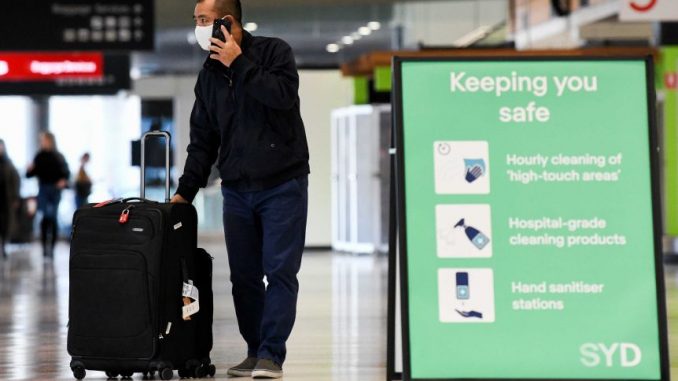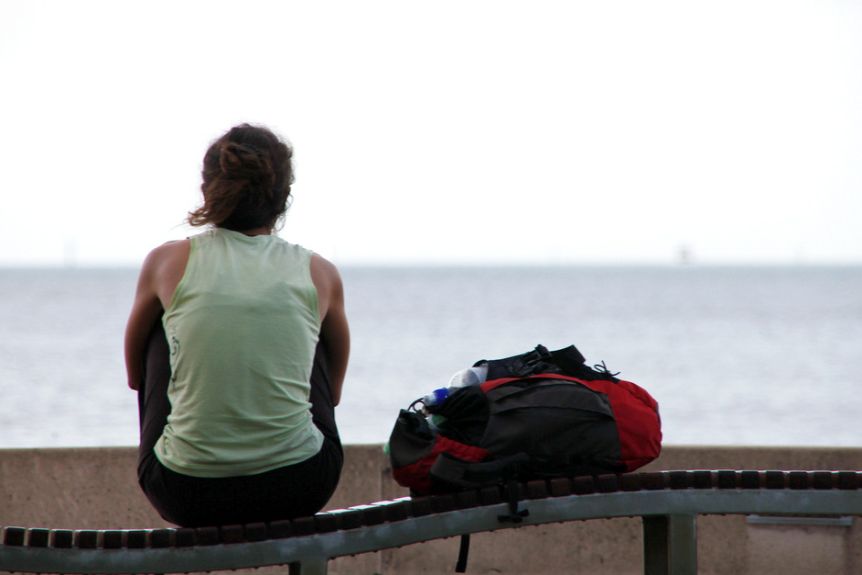
Does a government have to pass a law to make something compulsory, or can businesses make it a must-have anyway?
The world is about to find out, after Qantas CEO Alan Joyce declared international travellers must have a COVID-19 vaccine to get on a flight.
It looks like the vaccine won’t be mandatory for Australians at home.
But whether people will have access to their favourite goods and services if they don’t get the vaccine is more complicated.
Will the vaccine be compulsory for Australians?
The short answer is no, but it’s clear the Government wants as many people as possible to have it.
In August, Prime Minister Scott Morrison said he expected the vaccine “to be as mandatory as you can possibly make it”.
But just hours later, Mr Morrison said that the Government would not make vaccination mandatory for anybody.
“It’s not going to be compulsory to have the vaccine,” he said.
“There are no mechanisms for compulsory … I mean, we can’t hold someone down and make them take it.”
Will it be mandatory for international travellers?
Although Australians won’t have to be vaccinated, it’s becoming more likely that international travellers will.
The Government’s own vaccination policy already notes it could be mandatory for international travellers.
“While the Australian Government strongly supports immunisation and will run a strong campaign to encourage vaccination, it is not mandatory and individuals may choose not to vaccinate,” it says.
“There may however, be circumstances where the Australian Government and other governments may introduce border entry or re-entry requirements that are conditional on proof of vaccination.”

And travel to some countries already requires a vaccine.
For example, the Smart Traveller website tells Australians to carry their yellow fever vaccination certificate when travelling to Brazil, saying “you may need it to enter”.
Health Minister Greg Hunt said today that “early guidance” would be that international arrivals would be expected to be vaccinated or face quarantine.
Mr Hunt’s comments suggest those who can’t have the vaccine, for example those who are immunocompromised, will still be able to travel.
What is the air travel sector doing?
Qantas has declined to elaborate on the comments made by Mr Joyce yesterday.
But Mr Joyce isn’t the only one thinking about changes to international travel.
The International Air Transport Association (IATA), a group of 297 airlines including Qantas, is calling for systematic COVID-19 testing of all international travellers.
Airlines are driving the development of a digital passport that will share vaccination information.(ABC News- James Hancock)
This will record if someone has been vaccinated, and share the information with airlines and immigration authorities.
It’s due to be piloted later this year, ahead of a launch early in 2021.
Simon Westaway, the head of the Australian Tourism Industry Council, said requiring travellers to have a coronavirus vaccination could act as a “circuit breaker” for disruptions across the sector.
He argued Australia should also consider introducing rapid COVID-19 testing at airports, as used in a number of other countries.
“I think rapid testing is really starting to prove its worth, it’s important that authorities give that absolutely full berth,” he said.
“I do think you’re going to need a combination or a suite of really efficient, easy measures to give people confidence in travel, but importantly to have operators and authorities to have that confidence as well.”
What are businesses in Australia planning to do?
A vaccine is unlikely to be available until March, so it’s still too early for many businesses to be considering whether or not they will require customers to have it.
The National Retailers Association hasn’t received any feedback from members or had any discussions yet.
Coach operator Murrays said it was too soon to say if passengers would face vaccination rules.
But the Australian Dental Association said dentists would accept people without vaccinations.
“The fact is, visiting the dentist has always been safe to attend and there is no reason not to visit your dentist,” a spokesperson said.
“So there will not be a requirement for patients to show proof of having had the COVID vaccine — airborne diseases are managed every day in dental practice.
“But we can understand why Qantas wants to introduce a system of proof, as they will have passengers huddled together for long periods of time on flights.”
The AFL and NRL did not respond to requests for comment when asked if fans would face vaccination requirements.
Can businesses discriminate based on the vaccine?
In May, then-chief medical officer Brendan Murphy said employers and workers should turn away sick employees and visitors, and said the Government would “protect” and “defend” them if they did so.
“If one of your colleagues or an employee or a client turns up, you have every right to say, go away, I am not going to let you in.”
The Government has sought to increase the rate of vaccinations in the past.
When he was social services minister in 2015, Scott Morrison introduced the ‘no jab, no play’ scheme which withheld welfare payments from families who conscientiously objected to vaccinations.
On the other hand, it has shown respect to those reluctant to download the COVIDSafe app.
When legislating for the COVIDSafe app earlier this year, the Government included provisions that made it a crime to coerce someone to use the app by refusing entry.
But refusing someone a service because they do not have a vaccination due to medical reason could be illegal under the Disability Discrimination Act.
Paula O’Brien, senior lecturer at Melbourne Law School, is part of a group studying the legal implications of a vaccine for businesses.
“Anti-discrimination law and human rights law are two major areas for businesses to consider when working out a policy on mandatory COVID vaccination,” Dr O’Brien said.
She said hospitals, aged care and childcare facilities had already had to deal with employment issues around vaccination of employees, but COVID-19 was pushing these issues into new realms.
“While some businesses have navigated this around staff before, it’s new to be navigating it around customers,” she said.
Whatever has happened in the past, laws today are more fluid than they have been. An emergency period under the Biosecurity Act is still in place.
This has allowed the Government to overwrite other laws to prevent and control COVID-19, including restricting cruise ships and international travel.
The period was extended in September until December 17.
Will I have to pay for the vaccine?
No, the Government has promised the vaccine will be free and available to Australians in 2021.
But this will come at a cost to taxpayers.
The Government is spending more than $3.2 billion on COVID-19 vaccines.
